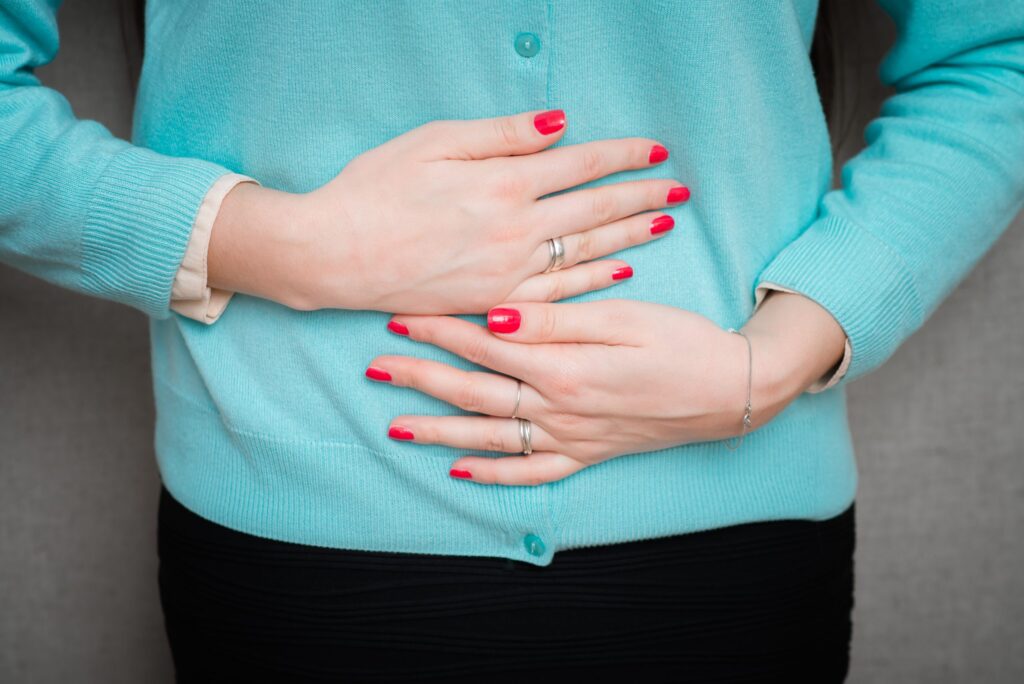Have you noticed your relationship with your stomach souring? Maybe you’ve caught yourself wondering more often why you two have gone from steely and reliable to ehh, things are moving too slow? It may not be you… it may be your menopause.
Prior to my menopausal journey, I’d only experienced constipation when I traveled. In our family, we called it “travel issues.” When I hit perimenopause, I noticed I was having these “travel issues” even when I was home. You could say the going was tough. Eventually, I was sick of dealing with perimenopausal digestive issues. If your stomach is wreaking havoc, don’t be fooled into accepting it as the new normal. Know what to look for and how it could be connected to your hormones. [ss_click_to_tweet tweet=”Tired of perimenopausal digestive problems? Don’t accept it as the new normal. Learn the signs and their hormonal connections.” content=”” style=”default”]
Hard to Stomach Symptoms
So how does menopause throw off our stomachs so much?? Apparently, decreasing amounts of estrogen and progesterone during perimenopause and menopause slows down the process of food passing through our GI system. Who knew?? Once the process of digestion takes longer, this can lead to constipation, increased gas and bloating. Oh joy! Other digestive issues we experience during menopause may include:
- Heartburn
- Diarrhea
- Abdominal pain
- Abdominal cramps
- Vomiting
- Lactose Intolerance
- Irritable Bowel Syndrome (IBS) or Inflammatory Bowel Disease (IBD)
Estrogen works to stimulate our muscles that line the length of the intestine, while progesterone works to relax it. During perimenopause and menopause, though, our changing levels disrupt this natural rhythm. This is why our stomachs can feel so off-beat– wreaking havoc on our GI and everyday lives! For some women, problems can become so persistent there are prominent health concerns at risk. Some research indicates that although menopause doesn’t cause IBS, it can exacerbate it if you already have IBS.
Something’s Gut to Give
[ss_click_to_tweet tweet=”Don’t let digestive issues be an inevitable burden during menopause. There are treatments and solutions available. ” content=”” style=”default”]Find a menopause specialist. Many women assume that digestive issues that stem from the onset of menopause are inevitable and untreatable. Not so, ladies! It is important to note that thyroid issues, stress, or sex hormones can cause GI symptoms, including weight gain and bowel problems. If you think your stomach issues could result from hormonal changes, don’t stay belly up. Go see a menopause specialist ASAP! If you don’t have one, learn how to find one here.
Your menopause specialist may suggest you try a probiotic and/or magnesium supplements. In addition, have a frank conversation about hormone therapy and whether it is the right choice for you. By regulating your hormones, you will regulate your digestive system and, in turn, improve gut health.
Find a GI doctor. Post-menopausal women have an increased risk for colon cancer. So, be sure to schedule your colonoscopy screenings, especially if you have a family history of GI cancers or polyps. Don’t forget to book your colonoscopy screenings, especially if you have a family history of GI cancers or polyps. Take charge of your health! Read my Colonoscopy 101 Menopause Mondays Blog for some colonoscopy tips.
At your appointment, be open with your GI doctor if you’re experiencing any of the following: rectal bleeding, family history of stomach cancer, abnormal weight loss, or extreme bloating.
Practice mindfulness and meditation. Other ways to combat digestive problems in menopause boil down to mindfulness and personal choices within our control. I know… easier said than done! But consider your lifestyle and follow your gut! I tried meditation, and it worked wonders.
Check to see if you have food allergies or intolerance. Some of us find that along with other intolerances (!!), suddenly, we have become lactose intolerant. Many women tell me that they cut out gluten to relieve bloating. A good way to test this is to cut dairy from your diet for a few weeks and see how you feel. Then do the same with gluten.
- Check your alcohol intake. There is such a thing as alcohol gastritis. Alcohol irritates the gut.
- Examine your diet. Eat a variety of nutrient-dense foods. Incorporate fiber and drink lots of water.
- Move your body! Exercise helps to stable hormone levels, improve mood, and…regulate the digestive system! By going for twenty-minute walks every day, you can improve menopause symptoms, as well as combat constipation.
Go with your gut! Reach out and get the help you need and deserve.
My Motto: Suffering in silence is OUT! Reaching out is IN!
If you want to educate your employees, colleagues, or friends about menopause, look no further! Book Ellen for your next event.
Sign up for MENOPAUSE MONDAYS® Blogs
Be sure to follow me on Instagram @menopause_mondays.
Follow me on TikTok @menopausemondays
Sign up for my fun YouTube Videos!
Download my free eBook: MENOPAUSE MONDAYS the Girlfriend’s Guide to Surviving and Thriving During Perimenopause and Menopause.
*EllenDolgen.com does not recommend, endorse, or make any representation about any tests, studies, practices, procedures, treatments, services, opinions, healthcare providers, physicians, or medical institutions that may be mentioned or referenced.





